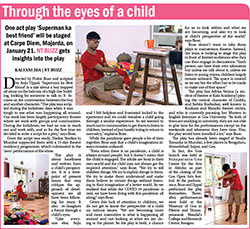
Through the eyes of a child

Directed by Prabir Bose and scripted by Anju Uppal. ‘Superman ka Best friend’ is a tale about a boy trapped all alone on the balcony of a high rise building, looking for someone to talk to. It focuses on the conversation between the boy and another character. “The play was scripted during the lockdown days when it was tough to see what was happening all around. Our work has been largely participatory theatre where we work with groups and communities. During the lockdown, we had no one to reach out and work with, and so for the first time we decided to write a script for a play,” says Bose.
Once the script was ready, Harkat Studios in Mumbai supported them with a 15-day theatre residency programme, which culminated in the ‘zero’ performance of the show.
The play is about loneliness and written form a child’s perspective. It is a view point of present issues that may critique the approach of development we all have been following for years. It also re-imagines a future through a child’s eyes.
“Like everyone else, Anju and I felt helpless and frustrated locked in the apartment and we could visualise a child going through a similar experience. So we wanted to reach out to communities to get them to listen to children, instead of just hastily trying to return to normalcy,” explains Bose.
While the pandemic gave people a lot of time together, Bose says that a child’s imagination always remains unheard.
“Even when there is no pandemic, a child is always around people, but it doesn’t mean that the child is engaged. The adults are busy in their own world and the child may not always get the required attention,” says Bose. “We try to tell children things. We try to explain things to them. We try to make them understand and make them believe in certain things without listening to their imagination of a better world. So we realised that while the COVID-19 pandemic is over we have been living with this pandemic all along.” says Bose.
Given this lack of attention to children, we do not get to know the perspective of a child on various issues. “We are becoming more and more insensitive to what is happening all around and not looking at what we are doing to the planet. So the play is both, a chance for us to look within and what we are becoming, and also try to look at child’s perspective of the world,” says Bose.
Bose doesn’t want to take these plays to mainstream theater. Instead, the team is looking to stage the play in front of limited audiences who they can then engage in discussions. “Each person can have their own takeaways but unless we talk about it, unless we listen to young voices, children largely remain unheard. The space is created as we say but the effort has to be made to make use of that space.”
The play has Aditya Verma (a student of theatre at Kala Academy) playing the central character of Guddu, and Sobita Kudrarkar, well known in Konkani and Marathi theater circles, and who is currently pursuing her Masters in English literature at Goa University. “As both of them are studying in university, they are not able to give time for the performances except on the weekends and whenever they have time. Else, the play would have travelled a lot,” says Bose.
The play has already been staged at Studio Tamasha in Mumbai, a few places in Bengaluru, Ahmedabad, Jaipur, and Goa.
In fact, the Goa launch was held at Sunaparanta-Goa Centre for the Arts in Altinho as part of the closing of the Goa Open Arts festival. At the performance, Bose and Uppal performed the play themselves. Thereafter, performances were held at the Museum of Goa in Pilerne and Dnyanprassarak Mandal’s College and Research Centre, Assagao.





